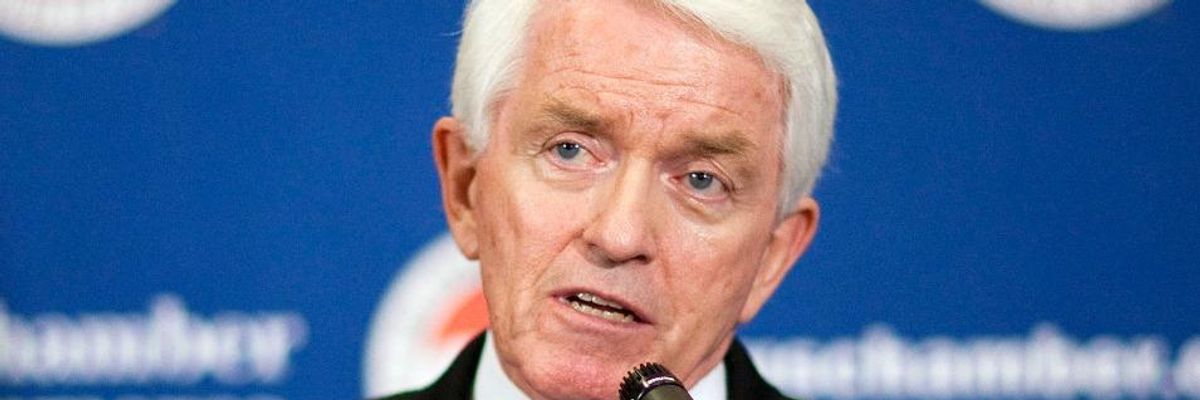On Wednesday, Tom Donohue, the head of the U.S. Chamber of Commerce, the lobby group for big business, gave his annual "State of American Business" address.
Donohue has a lot to celebrate. Corporate profits have risen for 12 straight quarters. Corporate profits as a share of the economy are at a record high. Wages as a share of the economy are at a record low. Effective corporate taxes are at a record low.
Here's some of what we heard:
A plea for more NAFTA-style trade agreements and revival of the Nixon-era fast-track authority to railroad them through Congress. No doubt these deals increase business power. But over the past two decades, these trade agreements have failed to meet their business sector and political backers' glowing promises, and instead have resulted in unprecedented and unsustainable trade deficits, the net loss of nearly 5 million U.S. manufacturing jobs, more than 57,000 factories with millions of higher-wage service-sector jobs offshored, flat median wages despite significant productivity gains and the worst U.S. income inequality in the past century.
Now Donohue called for a NAFTA-style deal with Asian and Latin American countries, and for Fast Track trade authority to strip Congress of its constitutional authority over trade. Fast Track empowers trade officials, directed by 600 official corporate trade advisers, to diplomatically legislate -- using "trade" agreements to put into place policies favored by the U.S. Chamber that failed in the sunshine of public debate. This includes imposing anti-consumer policies that have nothing do with traditional conceptions of "trade," covering matters such as patent and copyright rules, regulatory standards, food safety rules, special powers for corporations to sue governments before private tribunals over alleged lost profits, Internet governance and much more.
Complaints about the alleged enormous regulatory burden on business and the need for legislation to handcuff consumer, health, safety, environmental, worker protection and other agencies from issuing new rules, as well as to roll back Dodd-Frank financial reforms. Somehow, Donohue neglected to mention the costs of regulatory failures: The financial crisis and Great Recession (cost measured in the trillions); the BP oil disaster; Upper Big Branch and Sago coal mine disasters, among others; salmonella outbreaks involving everything from cantaloupe to peanut butter; widespread preventable workplace-related death and disease; life-threatening air pollution; and much more.
Donohue complained about the unfairness of regulation and how it injures the economy. He failed to say that the benefits massively outpace costs, even when measured by corporate-friendly cost-benefit accounting techniques. The Office of Management and Budget (OMB), part of the White House, finds that:
"The estimated annual benefits of major [f]ederal regulations reviewed by OMB from October 1, 2003, to September 30, 2013, for which agencies estimated and monetized both benefits and costs, are in the aggregate between $217 billion and $863 billion, while the estimated annual costs are in the aggregate between $57 billion and $84 billion. These ranges are reported in 2001 dollars and reflect uncertainty in the benefits and costs of each rule at the time that it was evaluated."
In other words, benefits of the rules issued over the past decade -- including during the George W. Bush administration -- are at least three times greater than costs, and as much as 13 times higher.
A demand to immunize companies from lawsuits that aim to hold them accountable for wrongdoing. Donohue harped on this bugaboo even though consumers' right to sue wrongdoers has been eviscerated by a series of U.S. Supreme Court rulings that enable companies to use fine-print terms in contracts to force disputes to be resolved by kangaroo arbitration panels rather than real courts, and to block consumers from banding together over shared wrongs. The Consumer Financial Protection Bureau has found that such fine-print provisions are pervasive in the financial sector, and they are manifold throughout the economy.
Even more ironic, perhaps, is the Chamber claim about the need for "legal reform" to protect corporate wrongdoers even as the Chamber engages in excessive litigation and even as it aids the giant foreign corporation BP in its effort to persuade courts to overturn a legal settlement into which it entered voluntarily. Here the Chamber is actually siding with an admitted felon foreign multinational against the interests of the small businesses injured by the BP oil disaster.
A call for greater development of dirty energy. Oil prices have plummeted, and U.S. production of oil and gas is skyrocketing. Meanwhile, evidence abounds that the world is rushing face-first toward climate catastrophe. Instead of calling for massive public investment in energy efficiency and renewable energy -- investments that would spur creation of new jobs, build up a fledgling U.S. industry and, eventually, yield enormous economy-wide savings on energy --insisted on the need to further subsidize and immunize the dirty energy industries.
He didn't mention the grave threat that climate change poses to business over time, a stunning oversight for the man who fancies himself the spokesperson for the corporate class, and who should be looking out for its long-term interests.
There are a few other things Donohue did not mention.
For example, the U.S. Chamber of Commerce purports to represent all business. Its funding base, however, is a handful of giant corporations. More than half of its contributions came from just 64 donors.
And the Chamber has disproportionate influence not because of the merits of its positions, but its deployment of money in politics. It was the largest dark money organization in the 2014 elections. The Chamber invested very heavily and successfully in the 2014 elections to defeat populist-minded tea party candidates somewhat independent of big business control in primaries and to elect corporate-minded candidates in the general election. And, the Chamber is the largest lobbying organization in Washington by far.
In his annual address, Tom Donohue routinely conflates the state of American business with the state of the American economy. Well, the state of giant corporations is flush. But regular people continue to suffer -- from precisely the policies that the Chamber urges.

